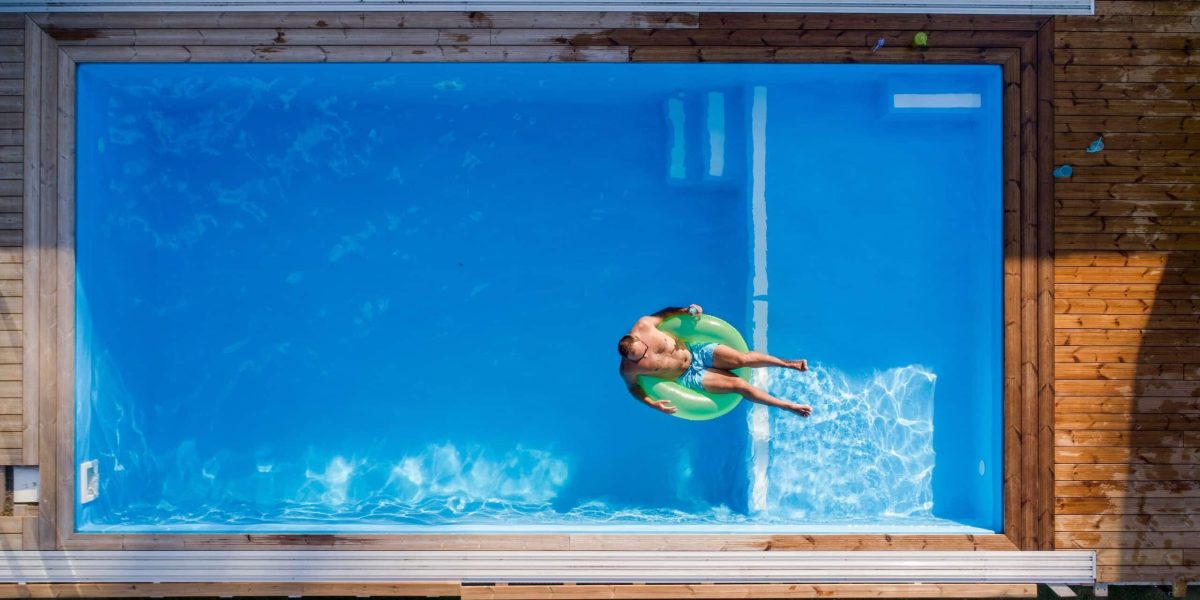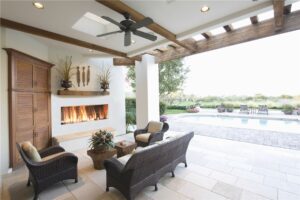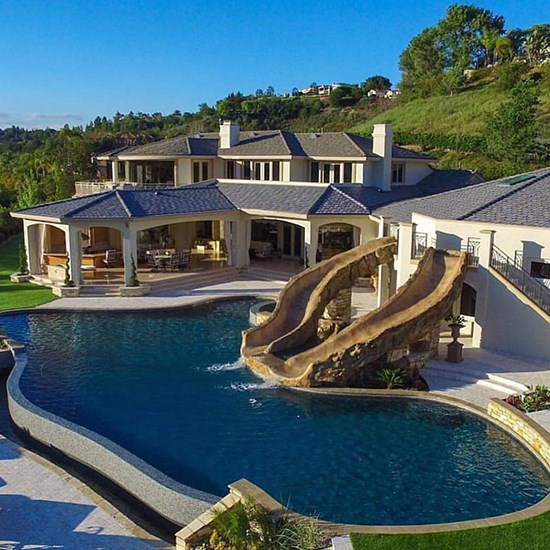It’s summer in the Carolinas, and everyone’s dreaming about floating in their own refreshing backyard pool. Ready to take the plunge (pun intended)? It’s time to explore your options. When it comes to inground pools, the two top contenders are Fiberglass vs Concrete Pools. And to help you make an informed decision, here are 8 cost comparisons between fiberglass and concrete pools. In this article we’ll cover initial installation costs, maintenance, durability, and long-term value.
Fiberglass Pools vs Concrete Pools – let’s dive in!
1. Initial Pool Installation Costs
![8 Cost Comparisons of Fiberglass vs Concrete Pools [The Definitive Guide] 1 backfilling trench for the gravel stones at constr 2023 11 27 05 24 03 utc](https://majesticpoolsinc.com/wp-content/uploads/2024/07/backfilling-trench-for-the-gravel-stones-at-constr-2023-11-27-05-24-03-utc-1024x683.jpeg)
Concrete Pools
Concrete pools typically have higher initial installation costs compared to fiberglass pools. This is because the process involves extensive labor, customization, and time. From excavation to pouring concrete, shaping, and finishing, it can take several months to complete a concrete pool.
Fiberglass Pools
On the other hand, fiberglass pools have lower initial installation costs. They come pre-manufactured and are simply placed into the excavated site. This process can be completed in just a few days. The reduced labor and faster installation contribute to the lower initial cost.
Give me a Ballpark:
A minimum you can expect for a professionally-installed pool of either type is something in the ballpark of $50,000 – $75,000.
You can easily spend twice this figure. The initial installation costs are crucial to consider and will vary depending upon pool size, finish, options, etc.
We understand that budgets are important BUT many pool owners have a list of things they wish they had done differently and it’s just impossible to change to their already installed pool. So, really consider your must-haves and incorporate them into your budget.
2. Long-Term Durability
![8 Cost Comparisons of Fiberglass vs Concrete Pools [The Definitive Guide] 2 empty outdoor swimming pool 2023 11 27 04 52 36 utc](https://majesticpoolsinc.com/wp-content/uploads/2024/07/empty-outdoor-swimming-pool-2023-11-27-04-52-36-utc-1024x683.jpeg)
Concrete Pools
Concrete pools are known for their long-term durability. They can last up to 50 years with proper care.
However, they require resurfacing every 10-15 years, depending on the finish. This resurfacing can be costly but is essential to maintain the pool’s integrity and appearance.
Fiberglass Pools
Fiberglass pools also boast impressive durability, with a lifespan of up to 40-50 years. The gelcoat surface of fiberglass pools is designed to withstand wear and tear, and these pools generally require less maintenance over time compared to concrete pools.
Which One Wins the Lifetime Award?
If we had to pick a winner in fiberglass vs concrete pools, concrete pools tend to outlast fiberglass pools. Lifetime costs are tricky but crucial. A high-quality concrete pool with a durable finished surface, is just going to outlast a fiberglass pool and probably have a lower lifetime cost. But a high-quality fiberglass pool is cheaper and quicker to install and will still last a very long time.
3. Customization and Special Features
![8 Cost Comparisons of Fiberglass vs Concrete Pools [The Definitive Guide] 3 a view of a beautiful backyard with a pool and out 2024 03 26 23 04 50 utc](https://majesticpoolsinc.com/wp-content/uploads/2024/07/a-view-of-a-beautiful-backyard-with-a-pool-and-out-2024-03-26-23-04-50-utc-1024x681.jpeg)
Concrete Pools
One of the standout benefits of concrete pools is their customization potential. They can be molded into any shape or size, accommodating unique designs and special features like waterfalls, tanning ledges, or integrated spas. This flexibility makes concrete pools an excellent choice for homeowners with specific visions for their backyard oasis.
Fiberglass Pools
While fiberglass pools come in a variety of shapes and sizes, they are limited to the designs offered by the manufacturer. However, modern fiberglass pools have come a long way and now offer many attractive options, including built-in tanning ledges and beach entries that make them accessible to pets and children.
Concrete is King of Custom
If you want a one-of-a-kind pool, concrete is definitely the way to go. Concrete pools can be made in just about any shape, size, or depth.
4. Maintenance Costs
![8 Cost Comparisons of Fiberglass vs Concrete Pools [The Definitive Guide] 4 composite swimming pool deck building 2023 11 27 04 58 23 utc](https://majesticpoolsinc.com/wp-content/uploads/2024/07/composite-swimming-pool-deck-building-2023-11-27-04-58-23-utc-1024x656.jpeg)
Concrete Pools
Concrete pools typically have higher maintenance costs. The porous surface of concrete can harbor algae, requiring regular cleaning and chemical treatments. Additionally, the need for resurfacing every 10-15 years adds to the long-term maintenance expenses.
Fiberglass Pools
Fiberglass pools are known for their low maintenance. The smooth, non-porous gelcoat surface resists algae growth, reducing the need for chemical treatments and frequent cleaning. This ease of upkeep translates to lower lifetime costs for fiberglass pool owners.
The Take-Away on Maintenance
Concrete pools cost more to maintain. They require more chemicals and a bit more intervention to maintain the proper chemical balance. Concrete pools also need to be resurfaced periodically. Depending upon the size of the pool, this can cost quite a lot (in the $10,000 range).
On the other hand, fiberglass pools sometimes need to be resurfaced as well. Again, whether this need will arise depends upon the initial quality of construction, maintenance, and climate.
5. Weather Resistance
![8 Cost Comparisons of Fiberglass vs Concrete Pools [The Definitive Guide] 5 swimming pool contractors](https://majesticpoolsinc.com/wp-content/uploads/2024/07/15a.jpg)
Concrete Pools
Concrete pools are structurally stable and can withstand various weather conditions. However, extreme freeze-thaw cycles can cause cracking and other damage over time, which might necessitate repairs.
Fiberglass Pools
Fiberglass pools are incredibly resilient and can endure all types of weather climates. They handle freeze-thaw cycles well without showing significant wear and tear, making them a great choice for regions with harsh winters.
The Heat Is On
If you’re interested in using your pool year-round, fiberglass is a great insulator and as a result it costs less to heat a fiberglass pool.
6. Resale Value
![8 Cost Comparisons of Fiberglass vs Concrete Pools [The Definitive Guide] 6 group of young people cheering with cider and eati 2023 11 27 05 05 35 utc](https://majesticpoolsinc.com/wp-content/uploads/2024/07/group-of-young-people-cheering-with-cider-and-eati-2023-11-27-05-05-35-utc-1024x683.jpeg)
Concrete Pools
Concrete pools can significantly increase the resale value of a home. Their customizability and durability make them an attractive feature for potential buyers, especially those looking for a luxury, one-of-a-kind backyard experience.
Fiberglass Pools
Fiberglass pools also add value to a home, but perhaps not to the same extent as a custom concrete pool. However, their low maintenance requirements and longevity are appealing to many buyers.
Pools Add Value to Your Home
Adding a pool to your home in the Carolinas will instantly add value. But concrete pools are preferred by homebuyers who see them as a quality-of-life investment with major financial returns.
7. Accessibility Features
![8 Cost Comparisons of Fiberglass vs Concrete Pools [The Definitive Guide] 7 young woman lying on a deck char by the swimming p 2023 11 27 05 15 02 utc](https://majesticpoolsinc.com/wp-content/uploads/2024/07/young-woman-lying-on-a-deck-char-by-the-swimming-p-2023-11-27-05-15-02-utc-1024x683.jpeg)
Concrete Pools
Both concrete and fiberglass pools can be designed with accessibility features. For concrete pools, features like sunshelves or beach entries can be easily integrated, making the pool accessible to pets and children. You have more accessibility options with concrete pools because you’re not stuck with a prefabricated shape.
Fiberglass Pools
Fiberglass pools offer similar accessibility options, with many models featuring built-in tanning ledges or beach entries. These features enhance the usability of the pool for families and pet owners. Fiberglass pools have come a long way in terms of accessibility but do not match the customization levels of concrete pools.
8. Structural Stability
![8 Cost Comparisons of Fiberglass vs Concrete Pools [The Definitive Guide] 8 oval swimming pool in big garden 2023 11 27 05 07 42 utc](https://majesticpoolsinc.com/wp-content/uploads/2024/07/oval-swimming-pool-in-big-garden-2023-11-27-05-07-42-utc-1024x683.jpeg)
Concrete Pools
Concrete pools are renowned for their excellent structural stability. They can be designed to fit any landscape, including complex terrains, and their strength ensures they remain intact for decades.
Fiberglass Pools
Fiberglass pools also provide excellent structural stability. Their flexible nature allows them to move slightly with ground shifts, reducing the risk of cracking. This flexibility makes them a robust option for various landscapes.
Let’s Talk About Thickness
Both pool materials offer structural stability; however, they vary drastically in thickness. The structure of a concrete pool is much thicker than a fiberglass pool. It’s hard to believe but fiberglass is so strong that many fiberglass pool shells are less than an inch thick!
Fiberglass vs Concrete Pools… The Winner!?!
When comparing the costs and benefits of fiberglass vs concrete pools, it’s clear that both have their unique advantages. Concrete pools offer unparalleled customization, long-term durability, and can significantly increase your home’s resale value. However, they come with higher initial and maintenance costs.
Fiberglass pools, on the other hand, provide a faster, more affordable installation, lower maintenance costs, and excellent durability. They are an ideal choice for those looking for a cost-effective, low-maintenance pool option. A large part of the decision will depend on your budget and pool financing options, desired features, and how much time and effort you’re willing to invest in maintenance.
So, knowing the benefits of a custom swimming pool is one thing, but actually making putting one on your property is another. But don’t worry, we’re here to help. Contact us today to book a free consultation.





